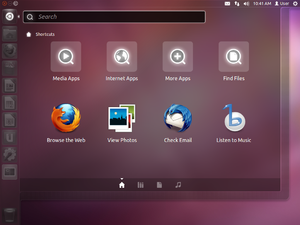Difference between revisions of "Ubuntu"
| Line 26: | Line 26: | ||
}} | }} | ||
| − | Ubuntu is a Debian based | + | Ubuntu is a computer operating system based on the Debian Linux distribution and distributed as free and open source software. |
| + | |||
| + | It is named after the Southern African philosophy of Ubuntu ("humanity towards others"). | ||
| + | |||
| + | Ubuntu is designed primarily for use on personal computers, although a server edition also exists. | ||
| + | |||
| + | Ubuntu is sponsored by the UK-based company Canonical Ltd., owned by South African entrepreneur Mark Shuttleworth. | ||
| + | |||
| + | Canonical generates revenue by selling technical support and services related to Ubuntu, while the operating system itself is entirely free of charge. | ||
| + | |||
| + | The Ubuntu project is entirely committed to the principles of free software development; people are encouraged to use free software, improve it, and pass it on. | ||
Revision as of 14:14, 29 December 2011
return to Plugins list
Ubuntu 11.10 http://www.ubuntu.com/ |
|---|
Information
ERPXE Module
- Name: - Ubuntu
- Version: 11.10
- Official website: http://www.ubuntu.com/
- License: GPL v2 License
- Wikpedia Page: http://en.wikipedia.org/wiki/Ubuntu_(operating_system)
- Download: http://www.erpxe.com/downloads
Plugin type
| Ubuntu | Anti-Virus | Deployment | Diagnostics | OS Installation | Live Media | Recovery Tools |
|---|---|---|---|---|---|---|
| No | Optional | No | No | Yes | No |
Plugin Requirments
| Ubuntu | CIFS | HTTP | Internet | NFS | Linux OS | Windows OS |
|---|---|---|---|---|---|---|
| No | Yes | Yes | No | No | Yes |
Screen Shots
Special Information
Ubuntu is a computer operating system based on the Debian Linux distribution and distributed as free and open source software.
It is named after the Southern African philosophy of Ubuntu ("humanity towards others").
Ubuntu is designed primarily for use on personal computers, although a server edition also exists.
Ubuntu is sponsored by the UK-based company Canonical Ltd., owned by South African entrepreneur Mark Shuttleworth.
Canonical generates revenue by selling technical support and services related to Ubuntu, while the operating system itself is entirely free of charge.
The Ubuntu project is entirely committed to the principles of free software development; people are encouraged to use free software, improve it, and pass it on.


